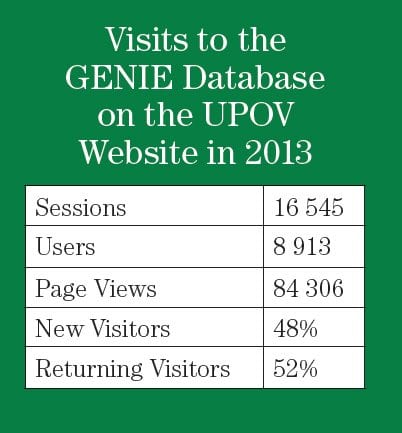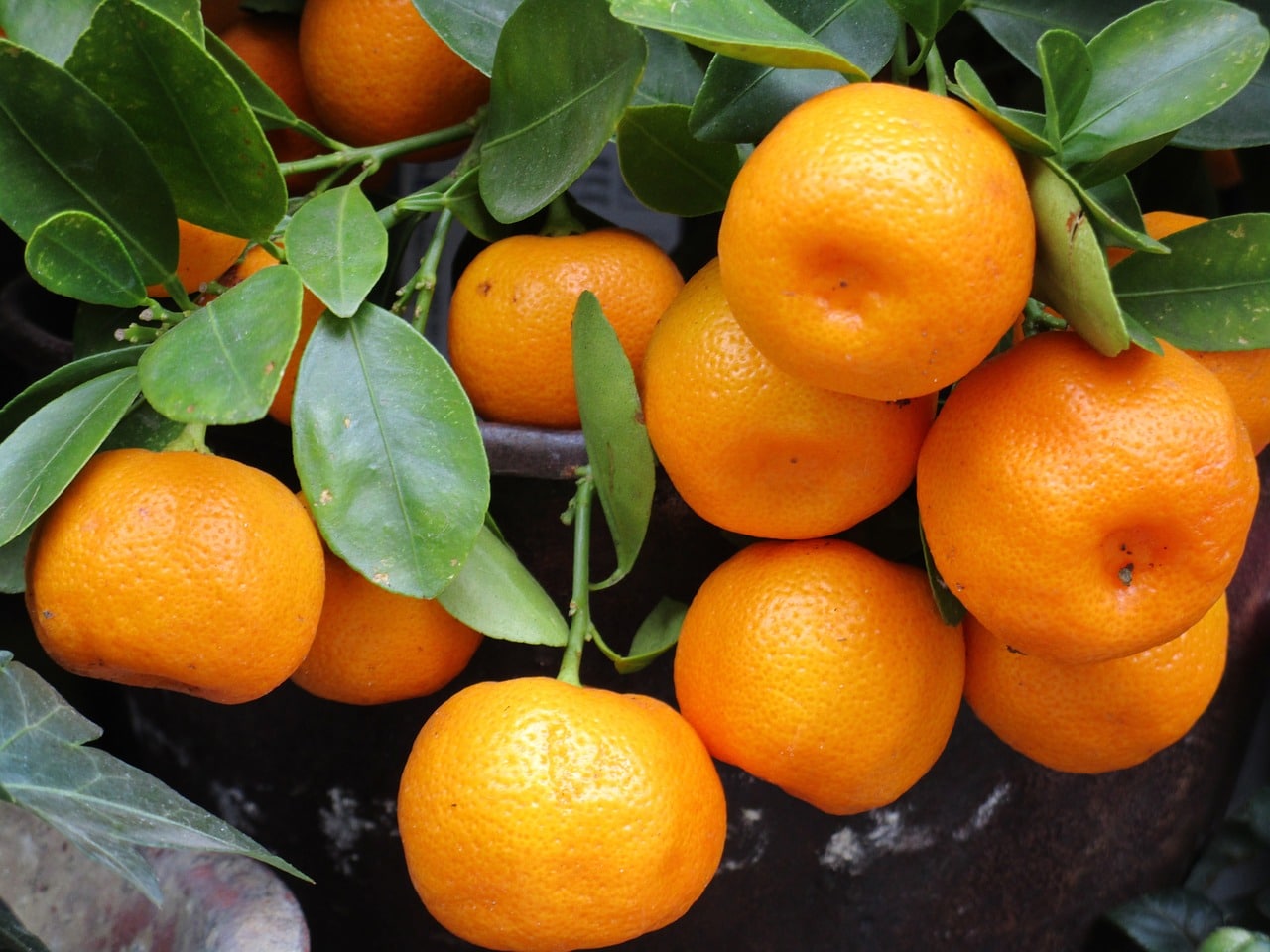In the past few years, The International Union for the Protection of New Varieties of Plants (UPOV) in Geneva has developed several databases, including the GENIE, PLUTO and UPOV Lex that provide plant breeders and the seed industry in the international community with invaluable information at their fingertips. While all three databases are relatively new, having launched since 2010, they continue to evolve to better meet user needs. Overall, the databases have received positive feedback. Below, you’ll learn a little bit about the functionality of each database, the information provided and user experience.

GENIE
The GENIE database provides information on GENera and specIEs, hence GENIE, in relation to protection offered by members of the Union, experience and cooperation in the examination of distinctness, uniformity and stability (DUS testing) and the existence of UPOV Test Guidelines. In addition, the GENIE database is the repository of the UPOV codes and provides information concerning alternative botanical and common names.
Peter Button, vice secretary-general of UPOV explains that cooperation with regard to DUS testing is an important benefit of the UPOV system. The GENIE database provides information on approximately 3,300 genera or species for which members of the Union have indicated their practical experience in DUS testing. In addition, there are almost 2,000 genera or species for which information is provided on agreements between members of the Union for cooperation in the examination of DUS.
“The GENIE database is a very important instrument for the PBRO Switzerland and the selection of a DUS testing location for a new variety,” says Manuela Brand, head of the Swiss Plant Breeders’ Rights (PBR) office. “For example, GENIE can serve as a tool for finding a suitable testing station with a similar climate. That is an important matter because Switzerland doesn’t test any varieties. With GENIE, we have an overview of the cooperation in DUS examination between the UPOV members. In addition, the GENIE database is helpful in checking UPOV codes or downloading test guidelines for a PBR application.”
“There is also an on-going program to increase the frequency and completeness of data provided by UPOV members.”

PLUTO
A second database for industry is the PLUTO database, which stands for PLant varieties in the UPOV system: The Omnibus. The data is supplied by the competent authorities of UPOV members and by the Organisation for Economic Co-operation and Development (OECD). A significant part of the information relates to plant breeders’ rights, plant patents and to national listings. Data from more than 600,000 documents is available in the UPOV search system. A key part of the PLUTO database is to provide information on variety denominations and a denomination search tab.
Also Yohann Bagot, controller at SICASOV, a French organization that collects royalties for breeders of different countries, is positive about PLUTO. “We use the PLUTO database to control breeders’ and co-breeders’ rights (owners, kind of protection and duration). PLUTO is practical, complete and quick to use,” according to Bagot.
SICASOV also controls seed companies and uses the information in PLUTO for this work. Bagot has one point for improvement — to have offline access to the database, or the ability to download more than 2 000 data sets per session. Sometimes with on the spot controls, he needs to have access to more than 2 000 data-points. The request has been forwarded to UPOV.
Jean Maison, deputy head of the technical unit of the Community Plant Variety Office, in Angers, France, also uses the UPOV databases. He mentions that when it was developed, its internal procedures in the early days of the Office, the CPVO had to create an efficient system to analyse variety denominations. The UPOV ROM, an ancestor of PLUTO, was a very precious source of information. Taking into account the need to consider additional information not included in the UPOV ROM (e.g. data from EU non UPOV Member States or commercial registers) and the need to create a search tool to test denominations for similarity on the other hand, the Office decided to develop its own database. One of the biggest challenges in developing a database is to keep it up to date.
Possibilities to find synergies were identified in this respect and a memorandum of understanding was signed in 2005 whereby UPOV and CPVO agreed to collect respectively non-EU and EU data from their respective Member States and exchange them regularly. The exchange has been operational for 10 years now and it can be said that PLUTO and the CPVO Variety Finder are closely interrelated.
UPOV Lex
And last, but not least, is UPOV Lex — a searchable database containing the legislation of Union members that have been notified in accordance with the UPOV Convention, the UPOV Convention notifications concerning individual members of the Union (e.g. accessions, ratifications, notifications on genera and species) and the text of the UPOV Convention and its Acts.
For more information visit: www.upov.int/upovlex/en/
Continuous Improvements
Current efforts focus on improving the searchability of these databases to test variety denominations for similarity. Button explains that the databases are all relatively recent developments in UPOV. PLUTO and UPOV Lex were launched in 2011 and GENIE was made publicly available in 2010.
However, in addition to continuously increasing the data included in each database, there have been improvements to the databases since their launch. In 2013, the following improvements were introduced for PLUTO:
- Page for searching variety denominations;
- Options to save search settings;
- Introduction of arrangements for the inclusion of data in the original alphabet, in addition to the data being provided in Roman alphabet; and
- Introduction of the possibility for contributors to the plant variety database to provide information on dates on which a variety was commercialised for the first time in the territory of application and other territories.
“For the future, further improvements are planned. In relation to PLUTO, a working group has been established to develop proposals for a UPOV denomination similarity search tool. There is also an on-going program to increase the frequency and completeness of data provided by UPOV members,” says Button.
Maison adds: “Species names are a corner stone for a plant variety database. When UPOV created its GENIE database, the CPVO immediately relied on it to deal with the issue of synonyms in botany and the harmonisation of species names. The CPVO Variety Finder works on the basis of UPOV codes and when it receives the application for a species for which there were no applications so far, the CPVO consults GENIE to standardise the species code or asks the UPOV office to create a new one. For the purpose of EU procedures, the CPVO asks UPOV for the creation of more than 100 codes every year and is proposing the development of a more informative UPOV code.”
It is always good to know if the products you release, in this case the databases, are being used and by whom. To that end, UPOV tracks the visits to the databases and these show that all three databases have high numbers of page views.
- Around 12 000 users have registered themselves to have access to these databases.
- GENIE hovers around 85 000 page views per year.
- PLUTO had 70 000 page views in 2013.
- UPOV Lex’s page views are relatively steady at around 90 000 per year.
- All three databases see the large bulk of the users go to the English version, and much lower percentages of users go to either the Spanish, French or German versions.
Interesting fact: the numbers of visitors from France are the highest for all databases, followed by countries, such as Switzerland, the United States and The Netherlands.












